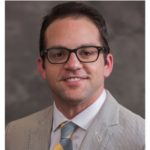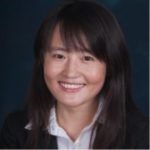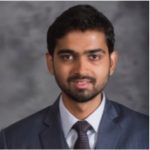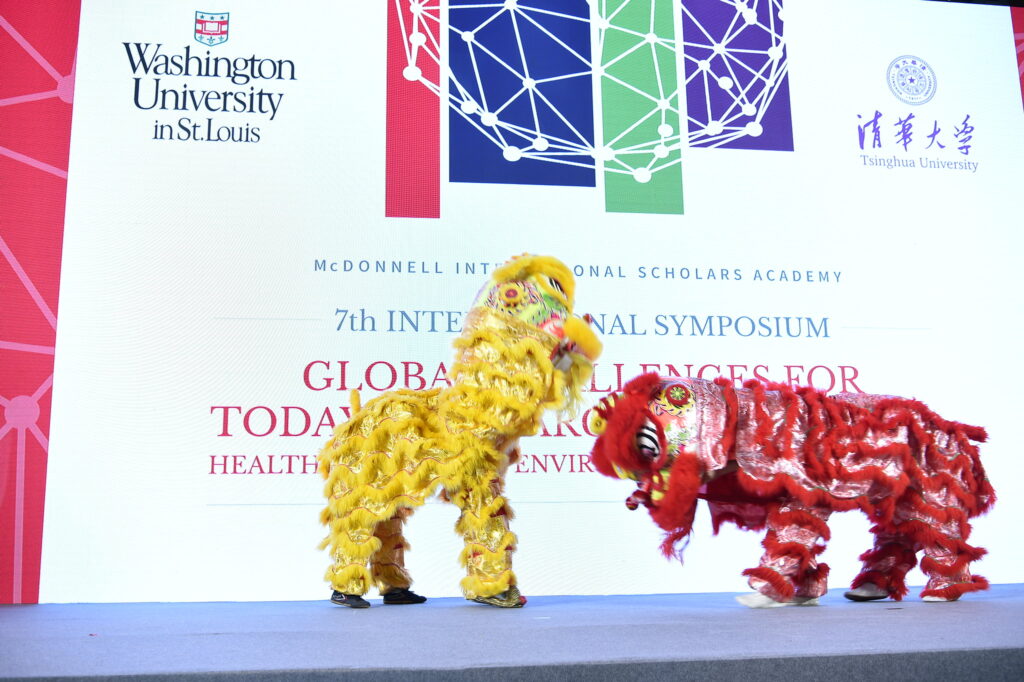Scholar Voices Symposium Edition is Scholar-driven content that sparks conversations and deepens connections within the McDonnell Academy, with our partners, and across the WashU community.
McDonnell Scholars shared insightful stories during 7th McDonnell Academy International Symposium in Beijing, China, a three-day event of executive sessions, workshops, panel discussions and poster sessions featuring research from current McDonnell Scholars. These stories highlight perspectives that reflect the diversity, experiences, and interests of our Scholars.
Read the stories:
- Looking forward to Beijing, Adam Manfredi
- Welcome to Beijing, Nan Hu
- Discussing Air Quality, Girish Sharma
- Building global health partnerships between China, the United States and Africa, Jae Lee
- Starting Small, Thinking Globally, Heesoo Cho
- Taking the Heat, Nan Hu
- Forming the will to brighten the way, Heesoo Cho
- Improving our society on a big scale, Jae Lee
- Deeply intertwined connections, Girish Sharma
Looking forward to Beijing
October 1, 2018 | Adam Manfredi, McDonnell Scholar

October 11-14, the McDonnell International Scholars Academy holds its 7th International Symposium in Beijing. The event is co-hosted by Tsinghua University.
The start of the McDonnell International Scholars Academy’s 2018 Symposium is just around the corner, and we will be leaving for China in less than two weeks. This will be my first time visiting China (besides changing planes in the Beijing airport twice, which doesn’t really count), so naturally, I am excited to experience a new environment, eat new food, and see the sites of the city. Also, the symposium itself offers many exciting lectures and events that I am sure will help generate thought provoking conversations and debates.
However, what I am most looking forward to is seeing what the McDonnell International Scholars Academy looks like outside of the confines of Washington University in St. Louis.

As an American scholar, my only interaction with the Academy so far has been at WashU. However, a vital part of the academy is our partner university, and without their support (and their students) there could be no academy. To this end, the opportunity to visit Tsinghua University, the host of the 2018 Symposium, is what excites me most. This is especially true because a number of my close friends in the Academy are from Tsinghua University, and they have told me a lot about their time as students at the university (it also doesn’t hurt that they have promised to show me the best places to eat and drink near the university). Also, the symposium is a chance for representatives from the various partner universities to come together as a truly international gathering.
We have this on a smaller scale in the Academy itself at WashU, but since this chance at the symposium only happens every few years, I look forward to being able to make new connections with representatives from the partner universities and, hopefully, broaden the scope of my academic and social networks.
Welcome to Beijing!
October 1, 2018 | Nan Hu, McDonnell Scholar

Agriculture, food and water challenges will be among the topics addressed during the McDonnell International Scholars Academy 7th International Symposium, held October 11-14 in Beijing and co-hosted with Tsinghua University.
As a Chinese native, what I feel most excited about the 7th McDonnell International Scholars Academy Symposium is the fact that it takes place in China.
This symposium focuses on agriculture, food and water; energy and environment; public health and aging. These are all challenges that the whole world is facing, and China is no exception. Having the Symposium in China means connecting local and global intellectuals and institutions, seeing China’s problem as part of the global community’s problems, and vice versa.
I will be thrilled to learn how this symposium addresses the increasing challenges of pollution, aging of the population, food safety and energy crisis in China, and in what ways Chinese scholars, corporations and government, with their experiences and resources, may contribute to the global response to these problems that threaten the human race.

Although I am not a Tsinghua University alum nor a Beijing local, I share the pleasure of welcoming my friends, colleagues and professors from my university to my country. It would be worthwhile to take a walk in the hutong areas, visit contemporary art museums in 798 art zone, have a drink in Wukesong, and talk to the students as well as faculty in Tsinghua. Plus, it is this city’s best season of the year. A century ago, a most prestigious writer Lao She wrote “I don’t know what heaven is like; but based on the experience of my life, Beijing’s autumn is heaven.”
I hope your time there offers opportunities to know the complex yet vibrant groups of people in China today, flavor the combination of local and international culture, and enjoy the blue sky, cool breeze and seasonal food in the heaven-like, great city of Beijing.
Discussing Air Quality
October 1, 2018 | Girish Sharma, McDonnell Scholar

Improving air quality is challenge in Beijing and much of Asia. Environment, agriculture, food and water issues will be among the topics addressed during the McDonnell International Scholars Academy 7th International Symposium, held October 11-14 in Beijing and co-hosted with Tsinghua University.
In the middle of a busy semester at Washington University in the 4th year of my PhD on understanding nanoparticles formation and growth in flames, I get this unique opportunity to visit Beijing, China. Finally, there is something to pull me out of the nano-world of my PhD, and relate them to the global challenges in the field of health, energy, and environment, and agriculture.
Last symposium, which was 2 years back, is still fresh in my memory. Indeed, holding koalas and kangaroos in Australia is not very easy to forget. Moreover, the discussions between industry leaders, academicians, and students from all over the world gave me a lot of knowledge about the importance of collaboration, and working together with a diverse group. Gearing up for Beijing Symposium, I am looking forward to the goal of solving the complex global problems on an international stage.

Coming from India, a developing economy and geographical neighbor of China, we share many similar problems, particularly in the areas of energy, and environment. The air pollution in the cities of Beijing and New Delhi is quite alarming to the health of the residing people. Therefore, the plenary sessions, panel discussions, and workshops focusing on the problems of air pollution, and control technologies are on the top of my agenda.
The problem of air pollution does not only take the engineers who find a technology to solve the problem, but there is a big role played by policy makers, government, and industry folks. This is a global problem, and needs intervention from people from wide expertise to come together as one, to solve it. Symposium will be the best platform to interact, network, and collaborate with the right people to make an impact on this global issue.
Workshop on MAGEEP-McDonnell Academy Global Energy and Environmental Partnership (http://mageep.wustl.edu/) of 35 universities is another very interesting event. I am volunteering to organize the workshop. As a part of MAGEEP, we have also created an Aerosol Doctoral Student Network, which includes graduate students from 10 different partner universities. We are planning to have a meet up to discuss the research problems, future opportunities to do collaborative research, and definitely have some fun at the symposium.
Needless to mention, that there will be a lot of fun at the Forbidden City, Great Wall of China, Buddhist temples, combined with some great food, and pandas!! Another tick mark on my bucket list. For the details of what really happens, you will have to wait till 11th October – the opening day of the symposium.
Building global health partnerships between China, the United States and Africa
October 1, 2018 | Jae Lee, McDonnell Scholar

Global health and strengthening collaborations to improve it will be among the topics discussed at the McDonnell International Scholars Academy’s 7thInternational Symposium in Beijing. The event is co-hosted by Tsinghua University.
China has been investing massively in Africa in recent years. Chinese companies have invested over $30 billion in the continent and will be investing even more in the future. In Uganda specifically, Chinese investments total over $4 billion. Concurrently, China has been emerging as major player in global health, helping to provide healthcare in low-income countries.
As a second-year medical student interested in global health and as the founder and CEO of a public health non-profit that primarily operates in Uganda, Empower Through Health (ETH), collaboration opportunities with Chinese institutions have been on my mind.
ETH is an innovation hub that finds collaborative solutions for the challenges that the most vulnerable global populations face. Additionally, we provide healthcare to 20,000 Ugandans, which will increase to 70,000 people within the year, and we conduct various clinical and agricultural research projects to help build healthy and productive communities. So far, our operations have just involved American and Ugandan institutions, but it would be only natural to include Chinese institutions as well, given their already large and still growing presence in related fields and regions.
China’s emergence in global health marks a paradigm shift, especially as the United States government decreases its commitment to the field. It is the first time that a developing nation has transitioned from being a recipient of aid to a major donor.
Building a robust global health presence not only makes the world a better and healthier place, but it has also been used as a tool for donors to increase soft power and create favorable trading deals.
Given China’s rise as a force in global health and my personal investment in the field, I am excited for the workshop on U.S.-China-Africa global health partnerships on October 14th. Given China’s relatively new entrance as a major potential donor for global health initiatives, the country has not yet developed a capacity to conduct extensive global health projects. Thus, partnerships with the U.S. organizations like ETH, which possess resources and expertise, will be beneficial for China to build its own capacity.

I also look forward to speaking with various partner university representatives about potential collaboration opportunities with ETH. I feel that we bring attractive elements – strong local and national connections to high-ranking officials in Uganda and a driven team that is capable of managing large-scale projects. Among Washington University’s partner universities, we have so far reached out to the Indian Institute of Technology and Yonsei University in South Korea, and we are excited by the prospect of connecting with Chinese institutions as well.
Starting Small, Thinking Globally
October 1, 2018 | Heesoo Cho, McDonnell Scholar

Agriculture, food and water challenges will be among the topics addressed during the McDonnell International Scholars Academy 7th International Symposium, held October 11-14 in Beijing and co-hosted by Tsinghua University.
As the cool autumn breeze pushes the hot summer heat in St. Louis, many of us at Washington University look forward to joining the 7thInternational Symposium held at Beijing, Tsinghua University. Committed to exploring ways of addressing and exploring the world’s most critical problems, this year’s symposium will focus on three twenty-first century global issues:
- Agriculture, Food and Water
- Energy and Environment
- Public Health and Aging.

Among the three topics, I especially look forward to the discussions on agriculture, food and water, because they form the basis of all human activities; survival. In an era of global surplus (in comparison to regional deficiency) where people aspire for well-being and take being as a given, we easily forget that it is only within a couple of decades that humanity as a whole have become free from the struggle of survival. Developments in mass production and efficient distribution have elevated the quality of life for many in ways unimaginable in the past. The majority of the world population still struggle with subsistence and poverty because of unequal distribution of resources not necessarily of its shortages.
I hope the panels on “Agriculture, Food and Water” remind us once again of the importance of understanding the fundamental layers in human activity with productive discussions on how these issues shape our everyday lives and pose global challenges that require collective resolutions.
As future global leaders who have the potential to not only think of but also act upon change, I hope this year’s Symposium at Beijing provides an opportunity for all participants to reflect on their possible contributions to the community, society, country, and world they live in.
Taking the Heat
November 5, 2018 | Nan Hu, McDonnell Scholar

On Oct. 14, during the 7th McDonnell International Scholars Academy symposium workshop “Taking the Heat: Using Journalism for Educational Engagement on Climate,” a group of experienced journalists and scholars highlighted journalism’s function in educating the public on climate change, and presented us the future of journalism as offering more solutions to this urgent global problem.
This workshop has its context. One week earlier, on Oct. 8, the UN Intergovernmental Panel on Climate Change released a report, which warns the global public of a series of severe impacts on human society if we fail to keep global warming to a maximum of 1.5 degrees Celsius. This landmark report was continuously addressed by scholars throughout the symposium, and with this workshop journalists and scholars offered thoughts on how to respond to this urgent issue from journalism’s perspective.
Climate change, especially at this stage, has become the biggest challenge facing the global community, and thus an important topic for reporters to address. However, as reflected by the speakers, reports on this urgent issue oftentimes fail to engage the broadest possible public in the world.

This workshop thus aimed to provide thoughts and tools to “bring the climate issue alive.” To Rick Dunham, co-director of the Global Business Journalism program at Tsinghua University, tackling climate change through journalism means first of all, “avoiding the politics trap.” It is ridiculous for journalists to keep attacking Trump and arguing global warming exists without dealing with the issue. What they should do now, argued by Dunham, is turn to the practical issues in global warming, break them down, and offer more solutions to the public.
Other speakers agreed on the importance of solutions in the representations of climate issues in journalism. Introducing the theory of solutions journalism, Doug Harbrecht, visiting professor at Tsinghua School of Journalism and Communication, calls for a kind of journalism that “aims to show how people are making things better.” To him, journalism should offer strong evidence that shows how a solution is working, and also honestly cover “any caveats or limitations associated with evidence of a solution.” Only in this way can journalism bring useful information to the readers and fulfill its responsibility for public service.
With its emphasis on solutions, this workshop joined hands with other talks and discussions of this symposium, which aim to solve the global problems. It invited me to think about literature’s role in this war against global warming: literature has long been representing various environmental issues to the readers. But other than showing what is wrong with our world, how can literature offer more direct solutions to these encroaching problems?
Forming the will to brighten the way
November 5, 2018 | Heesoo Cho, McDonnell Scholar

The challenges we face in the 21st century requires international cooperation and corroboration more than ever. Even domestic affairs such as primaries and general elections have global implications for defining and redefining democracy through practice. The 7thMcDonnell International Scholars Academy Symposium set the goal of addressing global challenges in health, energy and environment, and agriculture. Scholars and students around the world actively engaged in discussions both on and off the stage to share their concerns and suggestions regarding these challenges. For instance, in the session “Threats from Infection,” Professor William Powderly (Washington University in St. Louis) illustrated the intersection of two epidemics, HIV and Tuberculosis. Underscoring the importance of tackling stigmas attached to the marginalized, Professor Powderly stated, “We have the technology. How we use it will be the measure of success on how we control those issues.”
Issues of climate change, sustainable growth, and food security are no longer new. Many argue, including the scientists at the symposium, that we even have the means to resolve them. What we lack, according to Mr. Carl Casale (Board of Directors, Syngenta), is the will. There is a way but not a will. This means that the global challenges we face are no less a human problem than a scientific question.
The energy and capital used to develop new technologies should be equally devoted to address the problems with a broader audience and promote multiple levels of conversations. The Symposium was a platform and an opportunity to bring attention to both.

Bringing together people of different disciplines, from social work and comparative literature to medicine and chemistry, the Symposium reaffirmed the importance of communication among human beings. New technologies are important to confront global challenges. But at the end of the day, new technologies will be implemented by no other than humans.
I’m leaving Beijing with good memories of hospitality from Tsinghua University and other partner universities. I look forward to continuing our conversations of hope and promises in 2020 at Washington University in St. Louis.
Improving our society on a big scale
November 5, 2018 | Jae Lee, McDonnell Scholar

It was my pleasure and privilege to attend Washington University’s 7th International Symposium in Beijing. Business leaders who ran multinational companies and some of the world’s most accomplished academics were present at the symposium.
The concentration of leaders from different disciplines lent a great opportunity to listen to interdisciplinary methods of addressing the world’s most pressing issues in public health, agriculture, and clean energy.

Listening to and building personal relationships with these fabulously accomplished individuals gives me confidence that improving our society on a big scale is attainable for us given enough hard work, vision, and conviction.
As the C.E.O. of a non-profit organization Empower Through Health (ETH), which provides direct health care to 20,000 people in Uganda, is conceptualizing a medical school and conducts various research projects, I also enjoyed the workshop on U.S.–China–Africa global health partnerships. We heard African, Chinese, and American perspectives on global health. China, being a relatively new entrant to global health, has an amazing opportunity to learn from mistakes in global health and initiate its global health strategy avoiding errors made by other nations. All representatives emphasized the importance of having equal partnerships with African researchers— a notion I highly resonate with. All of ETH’s projects are conceptualized from the beginning with Ugandan input and equal collaboration. Too often, projects are written without local input and many opportunities to improve the project are missed.
I was also impressed by Tsinghua University’s robust international student program. About a dozen international masters’ in public health student of Tsinghua University were present In the audience of the U.S.–China–Africa workshop. They hailed from many different places, such as Zambia, Ethiopia, Zimbabwe, India, and Pakistan. Chinese justification for its international program was that not only it builds local capacity to improve global health, but also that the international students will collaborate with Chinese universities in global health work in the future. It was good to see Tsinghua University taking a leadership in a role in addressing global issues.
Further, we (ETH) found a potentially exciting collaboration opportunity with Fudan University on a maternal and child health global health project in Uganda. One of the directors of ETH, Dr. Peter Waiswa, is a Ugandan physician and public health expert based at Makerere University who is renowned for his work in maternal and child health. The representatives of Fudan University conduct maternal and child health implementation research in Ethiopia. We are looking forward to initiating a U.S.–China–Africa collaboration with researchers from Fudan University, Makerere University, and Washington University to develop innovative solutions to reduce maternal mortality in Uganda.
Attending the International Symposium in Beijing was incredibly educational and inspirational. I appreciate the opportunity that Washington University provided me, and I look forward to further exploring U.S.-China-Africa collaboration to work together to make our world a place where people have better health, and consequently, more agency to determine their own destinies.
Deeply intertwined connections
November 5, 2018 | Girish Sharma, McDonnell Scholar

My experience in Beijing during the 7thInternational McDonnell Academy Symposium was marked by kind hospitality of the people in China, thought-provocative sessions, and the following intense discussions with fellow scholars, professors, and industry experts. The Symposium highlighted the role played by research universities to solve the global problems of Energy, Environment, Health, and Agriculture.
After the last Symposium in Brisbane, this is the second Symposium that I attended. I can clearly feel the difference in my motivation to contribute. There has been a drastic improvement in my thought process, eagerness to listen and gain knowledge from the speaker and urge to interact with the speaker beyond the sessions to satiate my curiosity about the topic. The Symposium further prepares the McDonnell Scholars from 35 different partner universities, from the diverse fields ranging from aerosol science to human psychology to come together; ponder over the problems that humanity faces in the present; and come up with innovative solutions to mitigate them in the future.
As a PhD student in Aerosol and Air Quality Research Laboratory (AAQRL), I was most interested in the Energy and Environmental theme of the Symposium. As presented by the presidents of various partner universities, the focus of their governments is quite independent. Where China is working hard to solve the problem of air pollution for the past 5 years; India has just realized the problem. On the other hand, India has made advancement in installing the solar energy and aims to have at least 15 percent of the vehicles on road to be electric in five years. This provided a good opportunity to learn from each other.
As the Symposium unfolded, the deeply intertwined connections of air pollution to energy, environment to agriculture, and health to aging became more evident.

In the session about agriculture, it was mentioned: “1 in 9 people go to bed hungry every day, but unfortunately, policies are made by the individuals with a full stomach”. I was deeply intrigued by this statement, as how important sustainable agriculture is for our prosperity. When we went to dinner that night, we felt extremely bad to waste even a bit of food.
Coming from India, where culture and tradition are deeply embedded in our daily activities, as a kid, I was told that wastage of food, water, or any resource is linked to bad fortune. Now, looking at it as a scientist, I realize that it indeed brings bad fortune for not just me, but the whole planet. Another preventive measure is to incorporate yoga, meditation, and exercise in our daily lives. It not only will improve physical health and mental well-being, but contributes to our positive mindset to contribute to society as a whole. My solution strategy of taking small steps is well summarized by the Chinese proverb “Be not afraid of growing slowly, be afraid only of standing still”.
I believe that human beings should come together to solve (not divert) the problems created by humans in a sustainable manner while preventing the new problems to arise. The choice is completely ours, which side we choose!
